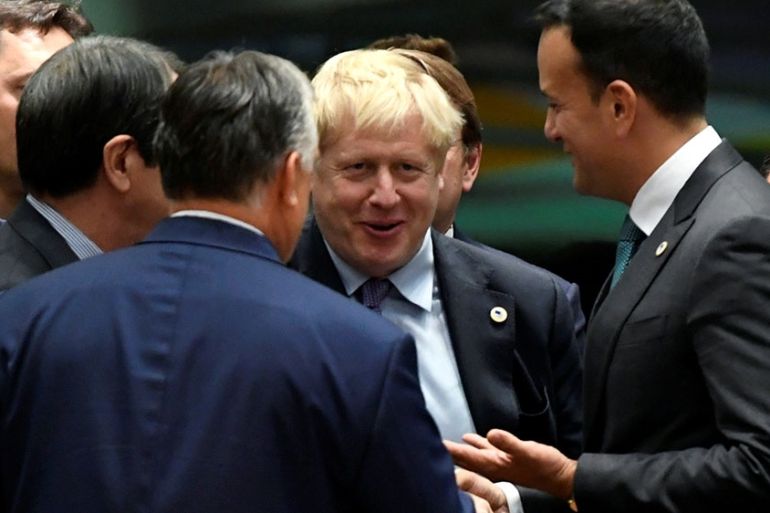First elation, then doubt: Draft Brexit deal whipsaws sterling
Volatility expectations for sterling over the next week have jumped to their highest since 2016.

Sterling surged to a five-month high and share prices of domestic British firms rallied on Thursday after Prime Minister Boris Johnson and European Union officials said a Brexit deal was done. But lingering doubts over whether the deal could pass the United Kingdom‘s fractious parliament soon checked those gains.
European Commission President Jean-Claude Juncker said Britain and the EU had, after a week of intense talks, sealed a new Brexit agreement.
Keep reading
list of 4 itemsNorthern Ireland agreement could end deadlock, restore government
Forced to become British: How Brexit created a new European diaspora
Number of Britons regretting Brexit hits new record high: Survey
Both sides had found a “legally operative solution” to avoid a hard border between the Republic of Ireland and Northern Ireland, which is part of the UK – a key sticking point, EU chief negotiator Michel Barnier told reporters.
That sent the pound to a five-month high and within a whisker of $1.30, while UK stocks that make most of their money at home surged.
But the gains were temporary as the Northern Irish Democratic Unionist Party (DUP) that British Prime Minister Boris Johnson relies on in parliament said it would vote against the deal at an extraordinary session on Saturday.
That revived fears that Johnson will suffer the same fate as his predecessor: a failure to get UK lawmakers to support the plan for the departure, plunging the country into another round of uncertainty.
“Amid the optimism about a deal, it is important to remember that the agreement still has to be agreed by the EU 27 heads of state as well as the UK parliament. As things stand, parliamentary ratification is far from certain,” Dean Turner, an economist at UBS Wealth Management, said.
The pound was down 0.2 percent by 1235 GMT, hitting $1.2793.
Sterling has been on a roller coaster ride recently, and is up seven percent since early September, when it hit the lowest since October 2016 at $1.19.
Volatility expectations for sterling over the next week have jumped to their highest since the 2016 Brexit referendum.
Against the euro, sterling dropped 0.7 percent to 87 pence, having earlier reached 85.77 pence.
The euro was buoyed by news of a deal and was last up 0.4 percent at $1.1116 while the dollar index fell 0.3 percent.
The FTSE UK Mid Cap Tradable index was well off its day’s high and was last trading up 0.3 percent. The blue-chip exporter-heavy FTSE 100 index rose 0.8 percent on sterling’s reversal.
British government bond yields initially surged, with 10-year yields hitting 0.79 percent, their highest since July, before falling slightly on the day to 0.69 percent.
“It looks like we’ve got something that would be the basis for a vote,” said Kit Juckes, macro strategist at Societe Generale. “Now we will try to scramble up if he (Johnson) has got enough votes to pass the deal through the parliament.”
Stocks and rate cuts
The agreement on a deal, while still to face a parliamentary test, has triggered a rethink on the outlook for UK stocks.
JPMorgan’s basket of London-listed companies that make their cash at home has enjoyed a meteoric rally in the past week.
In this period it has vastly outperformed the FTSE 100 and FTSE 250. The benchmark is considered a barometer of Brexit worries.
“While parliament approval is still required, the news today should provide legs to the rotation from UK exporters to domestic plays,” said Barclays Capital European equities strategist Emmanuel Cau.
Optimism that a Brexit deal would be finalised saw money markets reduce expectations of rate cuts from the Bank of England. They now see a 60 percent chance of a quarter-point cut next December versus 76 percent on Tuesday and 90 percent last week.